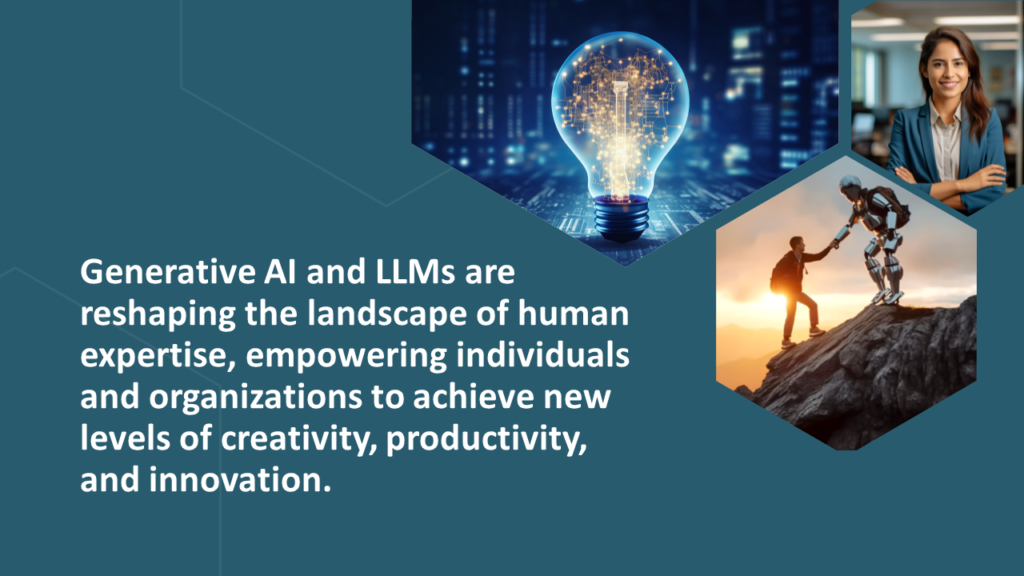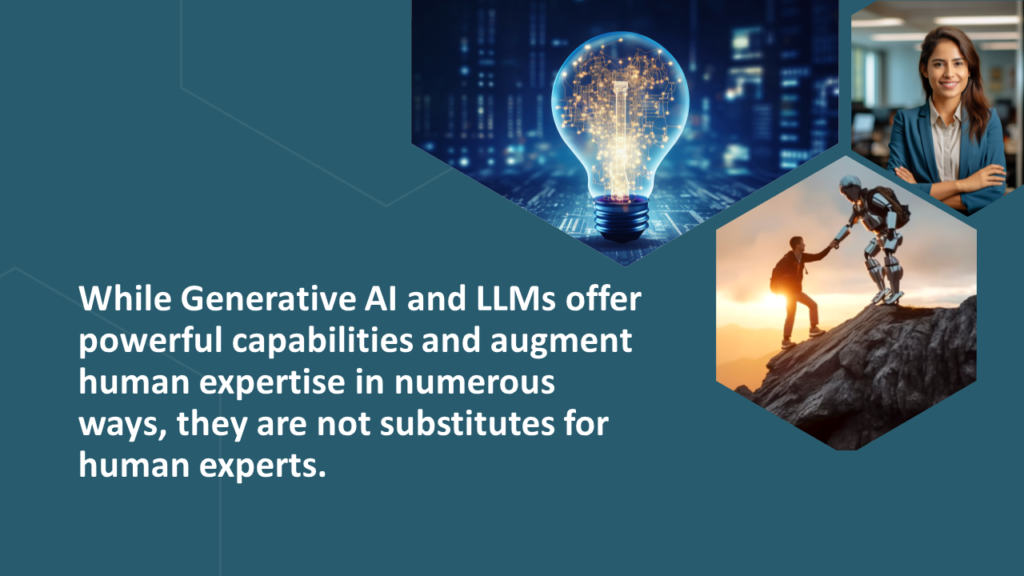How Generative AI and LLMs Support (Not Replace) Human Expertise
In the dynamic landscape of artificial intelligence, Generative AI and LLMs (Large Language Models) have emerged as transformative forces, reshaping the boundaries of human expertise. This blog delves into the symbiotic relationship between these cutting-edge technologies and human intelligence, emphasizing how they serve as invaluable allies rather than replacements. As we navigate the realms of creativity, problem-solving, and innovation, understanding how Generative AI and LLMs augment and amplify human capabilities becomes imperative. Let’s explore the ways these AI marvels bolster human expertise, fostering collaboration and advancements across diverse domains.
What are Generative AI and LLMs?
Generative AI and Large Language Models (LLMs) represent the pinnacle of artificial intelligence innovation, revolutionizing the way machines understand and generate human-like text. Generative AI refers to a class of AI models designed to generate new content, whether it be text, images, or even music, that mimics human creativity and expression. Within the realm of text generation, LLMs stand out as particularly powerful tools. These models are trained on vast amounts of textual data, learning the intricacies of language structure, semantics, and context.
At the heart of LLMs lies a sophisticated architecture known as the transformer model. This architecture enables the model to process and analyze large text datasets, capturing patterns, relationships, and nuances within language. By leveraging deep learning techniques, LLMs can understand and generate coherent, contextually relevant text, often indistinguishable from that produced by humans.
One of the most prominent examples of LLMs is OpenAI’s GPT (Generative Pre-trained Transformer) series, which has garnered widespread attention for its remarkable text generation capabilities. These models are pre-trained on vast amounts of text data sourced from the internet, books, articles, and other textual sources, allowing them to acquire a broad understanding of language.
Generative AI and LLMs operate on the principle of probabilistic sampling. When provided with a prompt or starting text, the model generates a continuation by predicting the most likely sequence of words based on its learned knowledge. This process involves generating multiple potential outputs and selecting the one that best fits the context and coherence criteria. However, it’s important to note that this process is sparked by human expertise, as human intervention is required to initiate the prompt.
Despite their impressive capabilities, it’s essential to recognize that Generative AI and LLMs are not conscious entities. They lack genuine understanding, intentionality, and creativity, operating based on statistical patterns and associations learned from data. While they excel at automating certain tasks, assisting in creativity, and accelerating workflows, they serve as complements to human expertise rather than replacements.
Generative AI and LLMs represent a remarkable fusion of technology and human ingenuity, empowering individuals across various domains to push the boundaries of innovation and creativity. As we continue to explore their capabilities and applications, understanding their role in augmenting human expertise becomes paramount.
Examples of how Generative AI and LLMs Augment Human Expertise
Generative AI and LLMs are reshaping the landscape of human expertise, empowering individuals and organizations to achieve new levels of creativity, productivity, and innovation across diverse domains. As these technologies continue to advance, their transformative impact on society is poised to expand exponentially, unlocking new possibilities and driving progress in the years to come. Here are some compelling examples illustrating their augmentative capabilities:
Content Creation: Generative AI and LLMs are revolutionizing content creation across industries such as marketing, journalism, and entertainment. These models can generate compelling articles, marketing copy, and even entire news stories with remarkable coherence and authenticity. By automating the creation of routine content, they free up human experts to focus on more strategic tasks, fostering efficiency and innovation.
Creative Expression: Artists and creators are leveraging Generative AI and LLMs to explore new frontiers of creative expression. From generating poetry and prose to composing music and designing artwork, these models serve as collaborative partners, inspiring and augmenting human creativity. By providing novel insights and generating fresh ideas, they enrich the creative process and expand the possibilities of artistic expression.
Language Translation: Generative AI and LLMs have revolutionized the field of language translation, enabling seamless communication across linguistic barriers. These models can accurately translate text between multiple languages, preserving nuances and context with remarkable fidelity. By facilitating cross-cultural communication and collaboration, they empower individuals and organizations to connect and engage on a global scale.
Personalized Recommendations: E-commerce platforms, streaming services, and social media platforms leverage Generative AI and LLMs to deliver personalized recommendations tailored to individual preferences and interests. By analyzing vast amounts of user data, these models can anticipate user preferences and behaviors, curating content and product recommendations that enhance the user experience and drive engagement.
Customer Service: Generative AI and LLMs augment human expertise in customer service by automating routine inquiries and responses, allowing human agents to focus on more complex and nuanced customer interactions. These technologies enhance efficiency and responsiveness, ensuring that customers receive timely and accurate support while enabling human agents to provide personalized assistance where empathy and understanding are paramount.
Market Research: By rapidly analyzing large volumes of data to identify trends, patterns, and consumer preferences, Generative AI and LLMs augment human expertise in market research. These technologies streamline the research process, providing valuable insights that empower human researchers to make informed decisions and devise effective strategies for product development and marketing campaigns.
Medical Diagnosis and Research: In the field of healthcare, Generative AI and LLMs are revolutionizing medical diagnosis and research. These models can analyze medical imaging data, patient records, and scientific literature to assist healthcare professionals in diagnosing diseases, predicting treatment outcomes, and conducting groundbreaking research. By augmenting human expertise with advanced analytical capabilities, they hold the potential to accelerate medical advancements and improve patient outcomes.
Education: By providing personalized learning experiences tailored to individual student needs and learning styles, Generative AI and LLMs augment human expertise in education. These technologies also assist educators in developing interactive and engaging educational materials, fostering a dynamic and adaptive learning environment.
Legal Documentation: In the legal field, human expertise is augmented by leveraging advanced AI technologies like Generative AI and LLMs, which streamline legal research processes and aid in drafting documents with accuracy and efficiency. These technologies enable legal professionals to sift through vast amounts of case law and statutes more quickly, allowing them to focus on higher-level analysis and strategic decision-making.
Why Generative AI and LLMs Cannot Replace Human Experts
While Generative AI and LLMs offer powerful capabilities and augment human expertise in numerous ways, they are not substitutes for human experts. Instead, they should be viewed as complementary tools that enhance productivity, creativity, and innovation when used in conjunction with human intelligence and oversight. By leveraging the strengths of both AI and human expertise, we can harness the full potential of technology to tackle complex challenges and drive meaningful progress in society. Here are several key reasons why Generative AI and LLMs cannot replace human experts:
Lack of Contextual Understanding: Generative AI and LLMs operate based on statistical patterns learned from data but lack genuine understanding of context, emotions, and human experiences. They may struggle to grasp subtle nuances, cultural references, and complex real-world scenarios, which human experts can readily comprehend and navigate.
Inability to Exercise Judgment: While these models excel at generating text based on learned patterns, they lack the ability to exercise judgment, critical thinking, and ethical reasoning. They may produce outputs that are factually incorrect, biased, or inappropriate in certain contexts, highlighting the importance of human oversight and intervention.
Limited Creativity and Innovation: While Generative AI and LLMs can generate text and ideas based on existing patterns in data, they may struggle to produce truly innovative or groundbreaking insights. Human experts bring creativity, intuition, and domain expertise to the table, enabling them to envision novel solutions, think outside the box, and push the boundaries of innovation.
Ethical and Societal Considerations: Generative AI and LLMs may inadvertently perpetuate biases present in the training data, leading to biased or discriminatory outcomes. Human experts play a crucial role in identifying and mitigating these biases, ensuring that AI systems are deployed responsibly and ethically.
Complex Decision-Making: In domains requiring complex decision-making, such as healthcare, finance, and law, human experts bring a wealth of experience, expertise, and judgment to the table. While AI can assist in data analysis and information retrieval, it cannot fully replace the nuanced decision-making capabilities of human professionals.
i3solutions: Combining Human Expertise with Generative AI and LLMs
At i3solutions, we embrace a philosophy that melds the unparalleled capabilities of human expertise with the transformative power of Generative AI and Large Language Models (LLMs). Our approach is centered on harnessing the strengths of both humans and AI technologies to drive innovation, efficiency, and excellence in our solutions.
Our team leverages Generative AI and LLMs to streamline processes such as content creation, data analysis, and decision support, allowing us to deliver innovative solutions that meet the evolving needs of our clients. By combining human expertise with cutting-edge AI technologies, we ensure that our solutions are not only technically robust but also profoundly connected to the human experience.
In essence, we believe that the true power of AI lies in its ability to complement and amplify human intelligence, rather than replace it. By embracing this philosophy, we continue to push the boundaries of what’s possible, delivering transformative solutions that empower organizations to thrive in a rapidly evolving digital landscape. Contact i3solutions today to explore how our integration of human expertise and advanced AI technologies can drive innovation and success for your organization.
Leave a Comment




